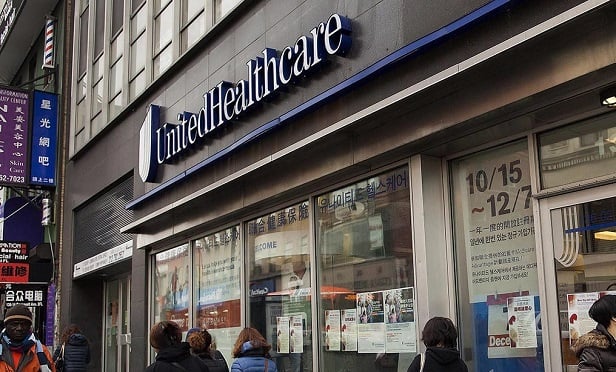 A UnitedHealth Group Inc. storefront in Queens. (Photo: Michael Nagle/BB)
A UnitedHealth Group Inc. storefront in Queens. (Photo: Michael Nagle/BB)
Executives at UnitedHealth Group Inc. kicked off the first-quarter earnings release season for life and health insurers by declaring that they're the ones making real progress at improving the U.S. health care delivery system.
David Wichmann, UnitedHealth's chief executive officer, told securities analysts that the Medicare for All proposals now under discussion would lead to wholesale disruption of the U.S. health care system and drive up costs, without doing much to increase access to care.
Related: UnitedHealth slams Medicare for All plans
But Wichmann did say the company supports universal coverage, based on existing programs.
“The path forward is to achieve universal coverage, and it can be substantially reached through existing public and private platforms,” Wichmann said.
Wichmann talked about his company's vision for universal coverage during a conference call the company held to go over its first-quarter earnings.
Earnings
UnitedHealth is reporting $3.6 billion in net income for the quarter on $60 billion in revenue, up from $2.9 billion on $55 billion in revenue for the first quarter of 2018.
The company ended the quarter providing or administering major medical coverage for about 50 million people, up from 49 million people a year earlier.
Medicare Advantage enrollment increased to 5.2 million, from 4.8 million.
The number of Medicare supplement insurance insureds held steady at about 4.5 million.
Enrollment in international plans held steady at 6.1 million.
Health system change efforts
During the conference call, UnitedHealth executives highlighted the company's efforts to improve access to health care.
One effort is a joint project with the American Medical Association, to create official diagnostic codes that health care providers can use to indicate that patients need help with the “social determinants of care,” such as access to food or shelter.
Executives also talked about efforts to give patients access to drug company rebates at the point of sale.
UnitedHealth has tried that approach on its own fully insured commercial group members, and that has helped patients save $130 per eligible prescription, and, in some cases, increased adherence to physician recommendations by up to 16 percent, executives said.
The company said it will be encouraging self-insured group plans and the customers of its OptumRx pharmacy benefits manager unit to adopt that same approach.
Resources
Links to information about UnitedHealth's earnings are available here.
Read more:
- Health stocks crumble as fears of Medicare for All snowball
- UnitedHealth's MLR rebates to employers soar 40 percent
- Insurers returning to pre-ACA profitability
© 2025 ALM Global, LLC, All Rights Reserved. Request academic re-use from www.copyright.com. All other uses, submit a request to [email protected]. For more information visit Asset & Logo Licensing.







